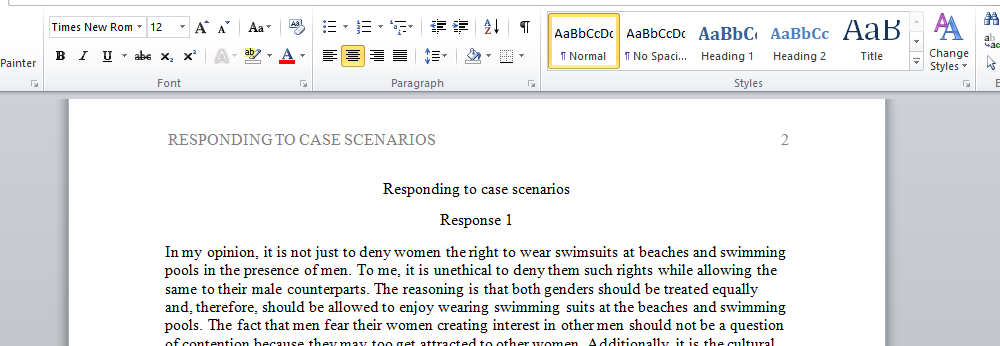Respond to the following prompt.
Respond to the following prompt.
On June 12, 1999, the New York Times (p. A4) reported that in Muslim West Beirut, Lebanon, women and men are expected to avoid sunbathing together except when they are engaged or married to one another. At one beach, “only a handful of women could be seen, and most were fully clothed, and sheltered by tents or beach umbrellas. Those who swam simply strolled into the water, until their baggy dresses began to float along beside them. . . . ”
“I don’t bring my fiancee here, because if someone said something like ‘what a beautiful girl,’ there would have to be a fight,” said Hassan Karaki, who sat with other men on an all-male beach.
Randa Harb, 27, wore a modest pair of shorts and a tank top as she sat under an umbrella with her bare-chested husband and young son. “If you wear a bathing suit, you’re going to attract more attention,” Mrs. Harb said. “So my husband won’t let me, because he doesn’t want people to look and talk.”
Lebanon is not alone as home to a culture averse to women who show “too much” skin. In Iran, a strict Muslim republic, the insistence on female “modesty” means that women may not even enter hotel pools. In most Arab countries, except among elites, a standard women’s bathing suit is a dress.
Now answer the following questions:
- To what extent does the cultural practice of denying women the right to wear swimsuits at beaches and swimming pools where men are present seem ethical or unethical to you?
- On what ethical concepts and principles do you base your reasoning?
- What similar situations can you think of where women (or men, for that matter) are expected not to do certain things either because of religious, legal, or social principles?
Respond to the following prompt:
What ethical obligations do I have to those for whom I work and for those whom I will affect as a result of my work?
Use the following websites to help you respond to the prompt. You may also locate other, reliable and credible web resources.
- Professional Ethics Bibliography
- Professional Ethics for Economic Botanists
- Professional Ethics for University Professors
- Professional Ethics and Wrongful Discharge
- Professional Ethics for Information Systems
- Code of Ethics for Social Workers
- Ethics in Nursing
- Ethics in Law Enforcement
A thoughtful opening response will consider the following:
- The specific code of ethic for your occupation
- The purpose of that code of ethics
- The consequences of violating the code
Introduction We are all the complex products of many experiences, positive and negative, and often we don’t consider how these experiences influence us daily, hourly, and in terms of our behavior, attitudes, interaction with others, and willingness to compromise. To become a strong critical thinker, it is imperative that we substantially consider the effects that our past, our emotional baggage, our predispositions can have on our present and our future, and that we not let ourselves become puppets or automatons to all the impressions, habits, and prejudices that are swirling within and around us.
The Prompt
How does bias and background affect our decision-making process and our judgments of other people? Give specific examples.
Resources
You may use these sites as you complete this assignment. You may also locate other reliable, credible sources online.
Specifications
A thoughtful opening response will consider:
- Specific areas in which you are able to identify bias in your own thinking.
- Particular experiences which have influenced your current attitudes and positions.
- Strategies you have or are developing to monitor and modify bias in your private, professional and communal relations with others.
Answer preview for What ethical obligations do I have to those for whom I work and for those whom I will affect as a result of my work?

